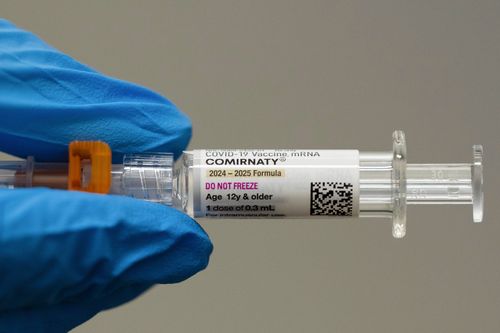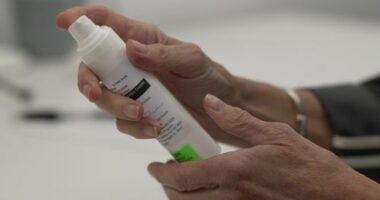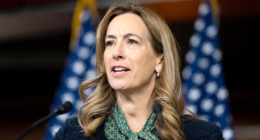Share this @internewscast.com
The US Department of Health and Human Services plans to revoke contracts and cut funding for certain vaccine projects designed to combat respiratory illnesses like COVID-19 and influenza.
Robert F. Kennedy Jr revealed that funding for 22 ventures, amounting to $500 million USD (approximately $770 million AUD), aimed at producing mRNA-based vaccines will be discontinued.
This move by Kennedy to halt these initiatives represents another step reflecting his consistent skepticism towards vaccinations, impacting decisions across the country’s health department.

He has dialed back support for COVID-19 vaccines, dismissed the advisory group responsible for vaccine guidelines, and withheld strong support for vaccinations amid escalating measles infections.
The health secretary openly criticized mRNA vaccines on his social media, justifying his choice to stop projects led by top pharmaceutical companies like Pfizer and Moderna, which develop immunizations for diseases such as COVID-19, the flu, and H5N1.
Kennedy stated, “To replace the flawed mRNA programs, we’re shifting focus to developing safer and more comprehensive vaccine strategies, such as whole-virus vaccines and innovative platforms that remain effective even with viral mutations.”
Infectious disease experts say the mRNA technology used in vaccines is safe, and they credit its development during the first Trump administration with slowing the 2020 coronavirus pandemic.
Future pandemics, they warned, would be harder to stop without the help of mRNA.
âI donât think Iâve seen a more dangerous decision in public health in my 50 years in the business,â Mike Osterholm, a University of Minnesota expert on infectious diseases and pandemic preparations, said.

He noted mRNA technology offered potential advantages of rapid production, crucial in the event of a new pandemic that required a new vaccine.
The shelving of the mRNA projects is short-sighted as concerns about a bird flu pandemic continue to loom, Dr Paul Offit, a vaccine expert at Childrenâs Hospital of Philadelphia, said.
âIt’s certainly saved millions of lives,â Offit said of the existing mRNA vaccines.
Scientists are using mRNA for more than infectious disease vaccines, with researchers around the world exploring its use for cancer immunotherapies.
At the White House earlier this year, billionaire tech entrepreneur Larry Ellison praised mRNA for its potential to treat cancer.
Traditionally, vaccines have required growing pieces of viruses, often in chicken eggs or giant vats of cells, then purifying that material.

The mRNA approach starts with a snippet of genetic code that carries instructions for making proteins. Scientists pick the protein to target, inject that blueprint and the body makes just enough to trigger immune protection â producing its own vaccine dose.
In a statement, HHS said “other uses of mRNA technology within the department are not impacted by this announcement”.
The mRNA technology is used in approved COVID-19 and RSV shots, but has not yet been approved for a flu shot.
Moderna, which was studying a combination COVID-19 and flu mRNA shot, had said it believed mRNA could speed up production of flu shots compared with traditional vaccines.
The abandoned mRNA projects signal a âshift in vaccine development priorities,â the health department said in its statement, adding that it would start âinvesting in better solutions”.
“Let me be absolutely clear, HHS supports safe, effective vaccines for every American who wants them,” Kennedy said in the statement.
Speaking hours later at a news conference in Anchorage, Alaska, alongside the stateâs two Republican US senators, Kennedy said work was under way on an alternative.
He said a âuniversal vaccineâ that mimicked ânatural immunity” was the administration’s focus.
âIt could be effective – we believe itâs going to be effective – against not only coronaviruses, but also flu,â he said.













